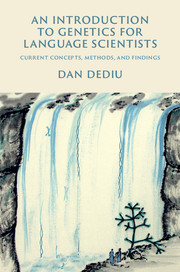Book contents
- Frontmatter
- Dedication
- Contents
- List of illustrations
- Acknowledgements
- 1 Introduction
- 2 Nature, nurture, and heritability
- 3 The molecular bases of genetics
- 4 Effects of genes on phenotype
- 5 Linkage disequilibrium and its role in finding genes
- 6 What do genes actually do?
- 7 The way forward: exome and genome sequencing
- 8 Population and evolutionary genetics
- 9 Interactions between genetic and cultural evolution
- 10 Conclusions, topics not covered, future directions
- Appendix The computer code
- References
- Index
- Glossary
9 - Interactions between genetic and cultural evolution
Published online by Cambridge University Press: 05 April 2015
- Frontmatter
- Dedication
- Contents
- List of illustrations
- Acknowledgements
- 1 Introduction
- 2 Nature, nurture, and heritability
- 3 The molecular bases of genetics
- 4 Effects of genes on phenotype
- 5 Linkage disequilibrium and its role in finding genes
- 6 What do genes actually do?
- 7 The way forward: exome and genome sequencing
- 8 Population and evolutionary genetics
- 9 Interactions between genetic and cultural evolution
- 10 Conclusions, topics not covered, future directions
- Appendix The computer code
- References
- Index
- Glossary
Summary
Here we discover that a new force, cultural evolution, is at work when it comes to humans and we discuss some cases where biological and cultural evolution interact, resulting in outcomes that are very hard to explain otherwise. Besides examples related to pathogens and nutrition, we will focus here on the fascinating cases of de novo emergence of sign languages. These cases clearly show that language is not shielded from the influence of our genetic background and might provide a useful model for understanding the emergence and evolution of language in our lineage. We end by investigating the idea that weak biases with a genetic component might be able to affect the process of cultural evolution of language and result in universal tendencies but also in patterns of linguistic diversity.
We saw in the last section (8.7) of Chapter 8 that humans certainly were not free from strong selective pressures acting mostly on local populations after they left Africa to conquer the whole world. Thus, it seems that, despite widespread ideas claiming otherwise, our culture did not completely shield us from the rigours of biological evolution, at least until relatively recently. Here we will continue this list of examples, but we will focus on selective pressures that were generated by our own culture, and that fed back on our genomes, shaping them. Sometimes, this moulding of our genomes through selection has favoured the cultural practices that generated those selective pressures in the first place, or even allowed the development of new cultural practices, creating a full co-evolutionary spiral between biological and cultural evolution. For an up-to-date and comprehensive overview of cultural evolution see Richerson and Christiansen (2013); gene–culture evolution is nicely introduced in Richerson and Boyd (2008) and Feldman and Laland (1996), while more recent developments also covering niche construction (discussed in Odling-Smee et al., 2003) are described in Laland et al. (2010), Richerson et al. (2010), and the special issue (number 366) “Human niche construction” of the Philosophical Transactions of the Royal Society B (Biological Sciences) from 27 March 2011.
- Type
- Chapter
- Information
- An Introduction to Genetics for Language ScientistsCurrent Concepts, Methods, and Findings, pp. 199 - 211Publisher: Cambridge University PressPrint publication year: 2015



